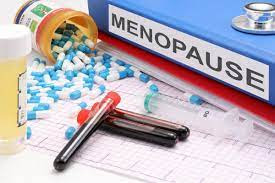You're more prone to acquire weight at certain points in your life, such as when you go to college or when you're pregnant. Menopause is also on the list, despite the fact that it is rarely discussed. Menopause is the end of your reproductive years, when your ovaries cease producing estrogen, a hormone that helps control your monthly cycle. According to the American College of Obstetricians and Gynecologists, you aren't officially diagnosed until you've gone 12 months without a period (ACOG).
Hot flashes, emotional changes, sleep trouble, vaginal dryness, diminished energy, and slowed metabolism are among the many changes that occur during perimenopause (the years when your body moves into menopause), according to the Mayo Clinic. Lauren Streicher, MD, a professor of clinical obstetrics and gynecology at Northwestern University's Feinberg School of Medicine and author of Hot Flash Hell, says, "Your body will undoubtedly alter when you go through menopause, and that's OK."
"While some doctors disagree, most people believe that menopause is linked to weight increase," says Mary Jane Minkin, MD, a clinical professor of obstetrics and gynecology and reproductive sciences at Yale Medical School. "From the start of perimenopause to one year without a period, the full menopausal mark, the normal weight gain—without eating more or exercising less—is roughly five to eight pounds." While this does not rule out the possibility of menopausal weight gain, she believes it can and does occur. In a nutshell, it's completely normal.
Why is it possible to gain weight during menopause?
There isn't a single cause, but there are other forces at play. "The decline in estrogen that women experience throughout menopause is certainly linked to weight gain," says Jennifer Wider, MD, a women's health expert. "As a result, the body's metabolism may decrease, and alterations in how fat is stored and distributed may occur." Some ladies may gain weight as a result of this."
According to Christine Greves, MD, a board-certified ob/gyn at the Winnie Palmer Hospital for Women and Babies, testosterone levels in the body drop at the same time. She continues, "Testosterone promotes muscular building, and muscle burns more calories than fat." "If you lose muscle, you don't burn as many calories as you used to."
According to Dr. Streicher, the symptoms of menopause might also lead to weight increase in the long run. She claims that there is a strong link between hot flashes and weight gain. When a woman experiences a hot flash, her stress hormone cortisol rises, causing a change in her metabolism.
"Hot flashes can also disrupt sleep," says Dr. Streicher. "And when you get less than seven hours of sleep, your hunger hormones are stimulated, and you make poor nutritional choices, such as picking high-carb items over broccoli."
Finally, menopause is a natural part of aging, and it has been connected to weight increase.
Gaining weight during menopause is, in the end, perfectly normal. There's no need to worry about it if you don't have any concerns about how it will affect your health. Nonetheless, experts suggest there are a few minor lifestyle aspects to consider:
Pay attention to your sleep. "Our first question is, 'How are you sleeping?' when someone comes into our clinic and their main concern is weight gain during menopause." According to Dr. Streicher. She recommends making sleep a priority and striving for at least seven hours per night.
Incorporate more protein into your diet. Dr. Wider recommends that you increase your protein consumption. Including fruits, vegetables, and whole grains in your diet can also help you stay healthy as your body changes. Exercise on a regular basis. Aim for 150 minutes of moderate-intensity exercise and two days of muscle-strengthening activity per week, according to the Physical Activity Guidelines for Americans. Regular exercise "may help reduce a normal loss in muscle mass," according to Wider. "It's also beneficial for preventing heart disease and osteoporosis, the two most common diseases that women have as they approach menopause," Dr. Minkin adds.
Alcohol should be consumed in moderation. Sticking to the suggested one drink per day or less will assist you avoid gaining weight. Dr. Wider points out that "alcoholic beverages add unnecessary calories to your diet and raise the risk of weight gain." Discuss your concerns with your doctor. Hormone treatment can ease hot flashes, night sweats, and possibly help prevent bone loss that can occur in early menopause, according to the American College of Obstetricians and Gynecologists.
To clarify, it's totally natural to gain a little weight and have your body change as you approach menopause. "Even if someone doesn't gain a pound," Dr. Streicher explains, "there's generally a redistribution." "Everything is OK."

Thanks for sharing 👍
ReplyDelete